Guppies, scientifically known as Poecilia reticulata, are one of the most popular freshwater fish kept in home aquariums. They are renowned for their vibrant colors, lively personalities, and the ease with which they breed. However, guppy lifespan is affected by several factors. While guppies typically live for around 1-3 years in captivity, various conditions can either shorten or extend their lifespan. Here are the key factors that impact the lifespan of guppies:
How Long Do Guppies Live?
Guppies, cherished by aquarium lovers, usually live between 1 to 3 years. Their lifespan can be influenced by their breed, living conditions, and care quality. By offering an ideal habitat, a balanced diet, and maintaining pristine water conditions, guppy owners can potentially extend their pet’s life beyond the typical range. It’s crucial for caretakers to understand the needs of their specific guppy breed, ensuring a proactive approach to their health, resulting in a longer and more vibrant life.
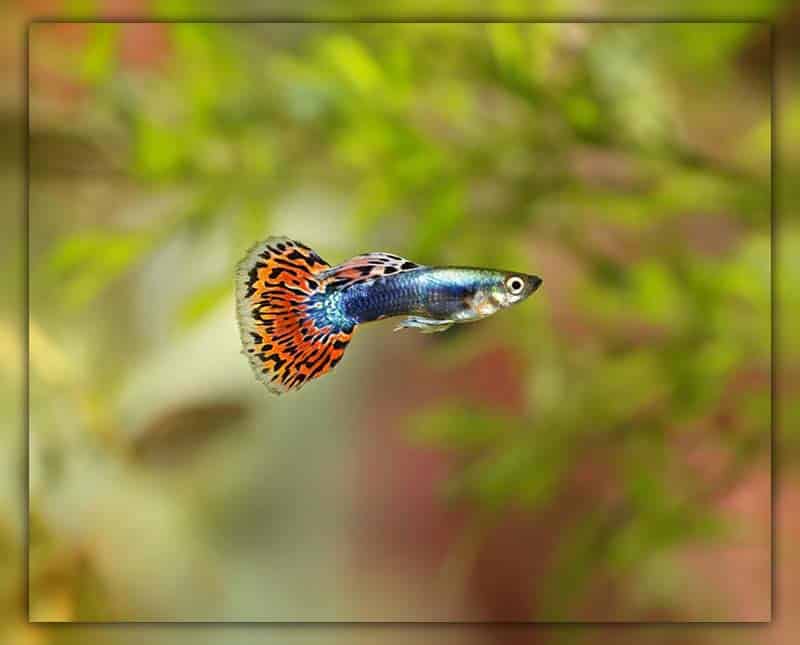
Guppy Life Cycle and Stages
The life of a guppy, known scientifically as Poecilia reticulata, unfolds through a captivating four-stage journey from birth to adulthood. For those passionate about guppies, understanding these stages is paramount to nurture a thriving community of these fish. Here’s a deeper look into each phase:
Fry Guppy
In the very beginning, guppies are termed as “fry.” These tiny beings, about a quarter-inch in size, are easily identifiable by their translucent color and notably large eyes. In their first few days, they draw nourishment from a sizable yolk sac. During this fragile period, it’s essential to provide them with specially crafted diets tailored to meet their unique nutritional requirements.
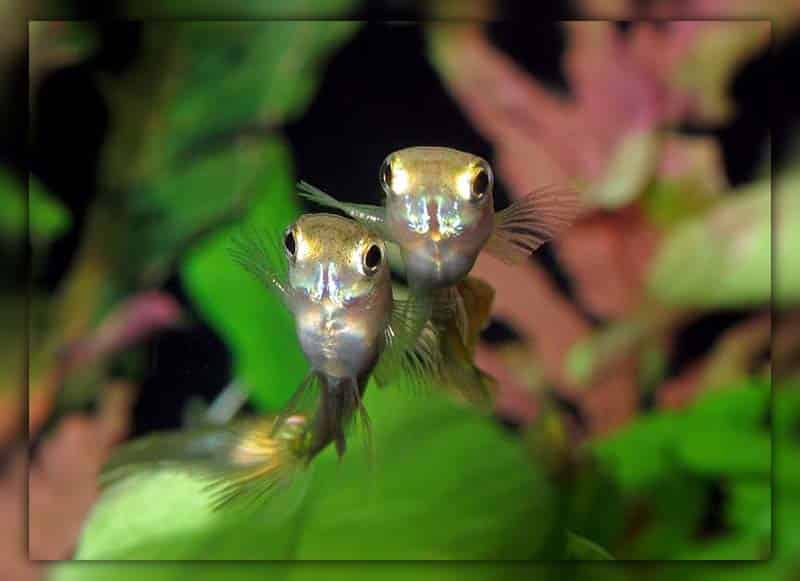
Juvenile Guppy
As they transition to the juvenile phase, guppies witness evident growth, reaching around half an inch. This stage is marked by the onset of their adult color patterns and the initial development of their fins. Also, there’s a clear start of their body taking the shape and contours of adult guppies, a transformation that can be keenly observed during this time.
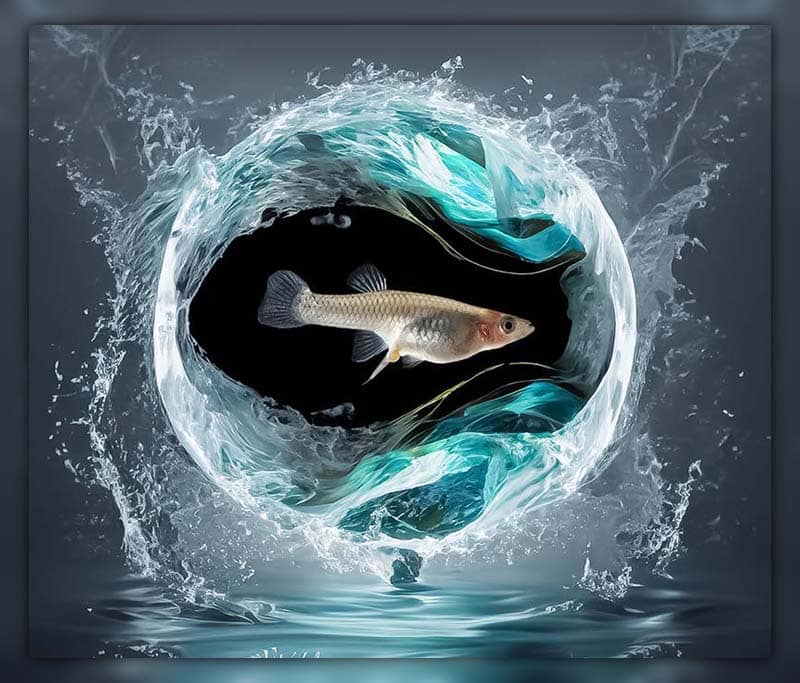
Young Guppy
Moving forward to the young guppy phase, these fish exhibit stronger growth, achieving roughly an inch in length. By now, their dazzling adult hues are fully visible, making them a delight to observe. Despite being young, they display a sense of independence—evidenced by their competent swimming and self-reliant feeding habits.
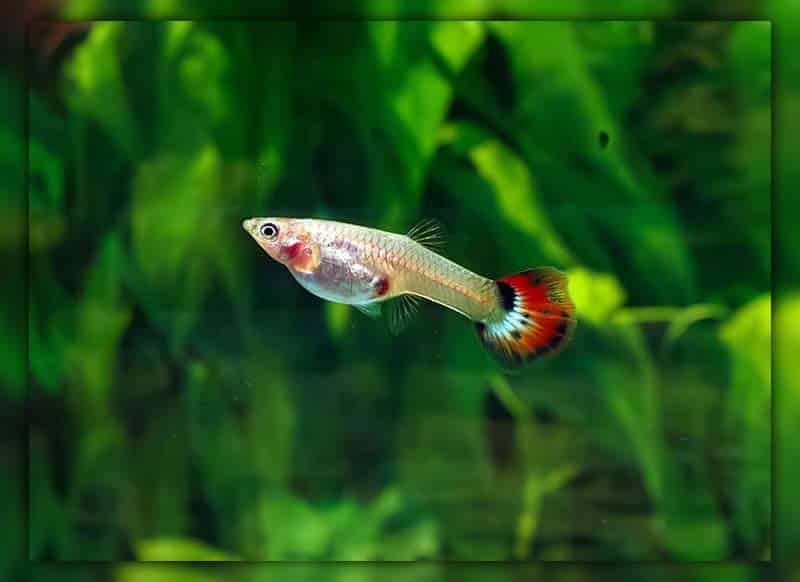
Adult Guppy
Reaching the pinnacle of their growth, the adult guppies step into their reproductive roles. Ranging between 1.5 to 2 inches, their vibrant colors and fully matured body play a pivotal role in reproduction. An intriguing aspect is the difference in maturation time between genders: males typically mature by 6 weeks, while females take about 3 months to reach sexual maturity.
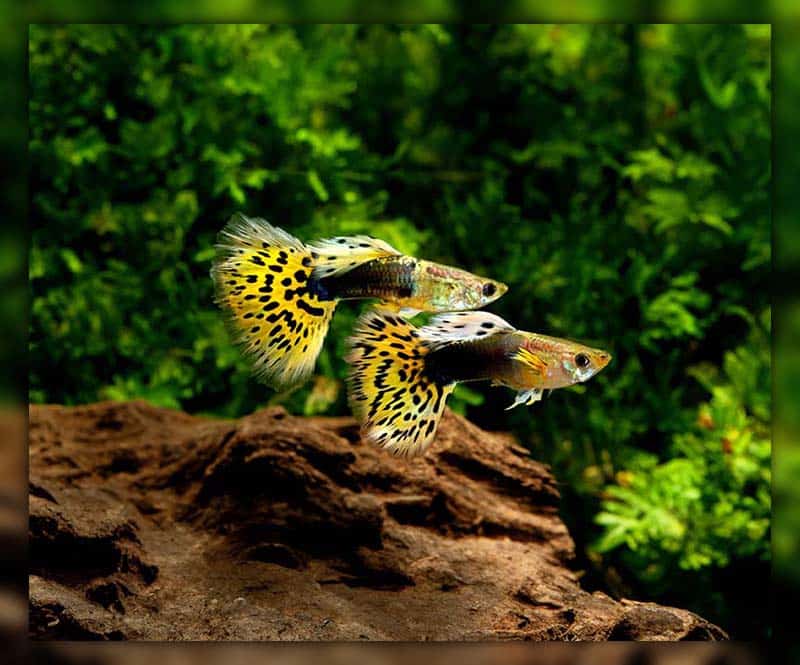
Factors Affecting The Lifespan Of Guppy Fish
Guppies have lifespans shaped by numerous environmental and biological determinants. Delving deep into these factors is key for anyone aiming to enhance both the longevity and vitality of these enchanting fish. Below, we touch upon several major factors that influence a guppy’s lifespan:
Guppies Genetics
Much like other species, genetics play a pronounced role in a guppy’s lifespan. Some genetic lineages may naturally have longevity traits, giving them an edge in lifespan. Familiarity with these genetic subtleties can be instrumental in optimizing their lifespan.
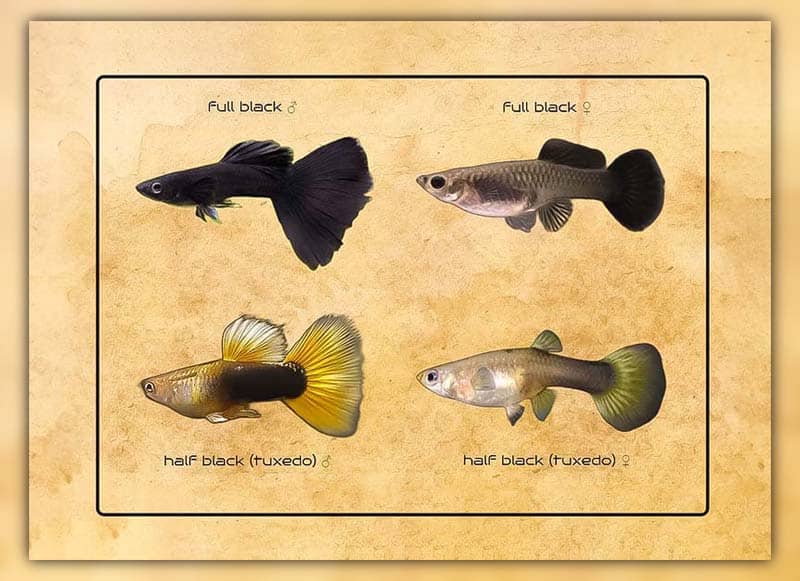
Poor Tank Conditions
A guppy’s health and lifespan are deeply linked to their habitat. Tanks with compromised water quality, excessive fish populations, and infrequent maintenance can breed numerous health challenges, potentially shortening their life. It’s crucial to prioritize optimal water conditions and suitable tank arrangements.
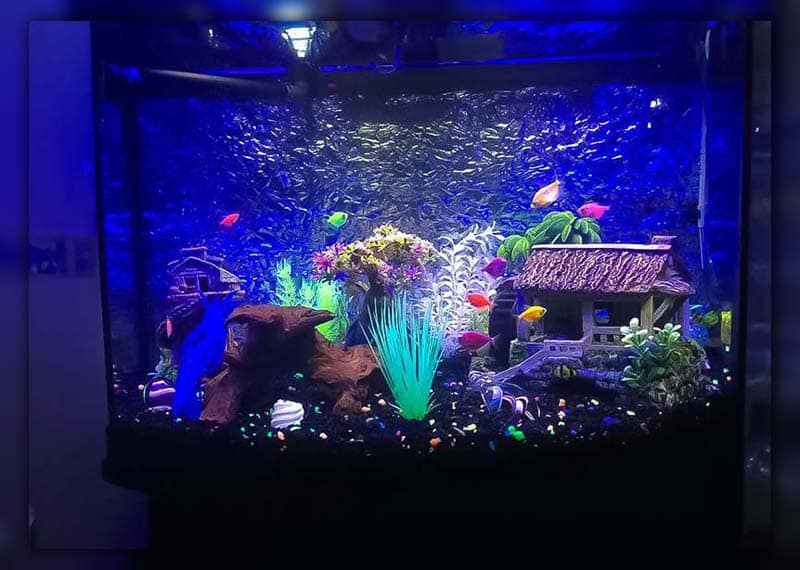
Poor Quality of Water
Water parameters matter. Guppies are sensitive to water quality shifts, especially concerning toxic substances like ammonia or nitrate. Delivering consistently clean water is non-negotiable for their health.
Cohabiting with Other Aggressive Fish
Peaceful guppies can often be at the receiving end of hostility from more aggressive fish breeds. Ensuring they share their habitat with compatible species and vigilantly observing fish interactions can prevent undue stress and potential harm.
Overcrowding
Space matters. Guppies thrive in environments where they can move and explore freely. Beyond that, providing ample hideaways can be a gamechanger, helping them maintain a relaxed and equilibrium-rich environment.

Excessive Light
An overload of light can amplify stress and disease vulnerability in guppies. Maintaining a well-balanced light regime and affording shaded spots are essential for their wellness.
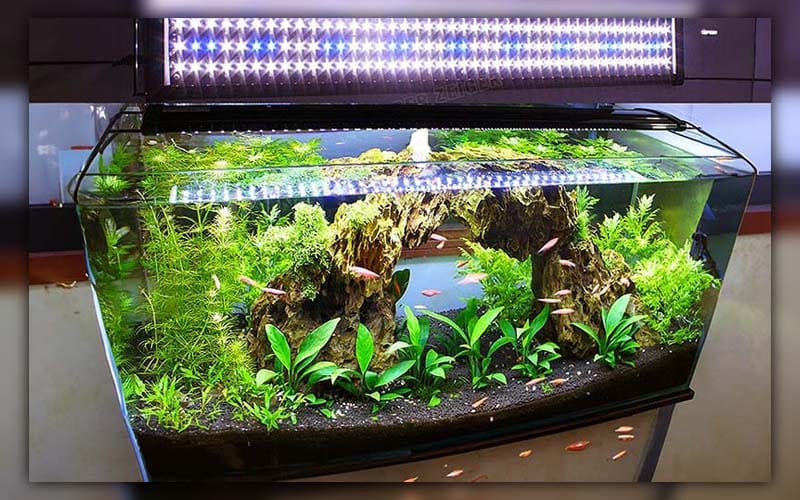
Pregnancy
For female guppies, pregnancy can be taxing. It’s paramount to ensure they receive optimal nutrition and adequate rest during this time to support both their health and successful breeding endeavors.
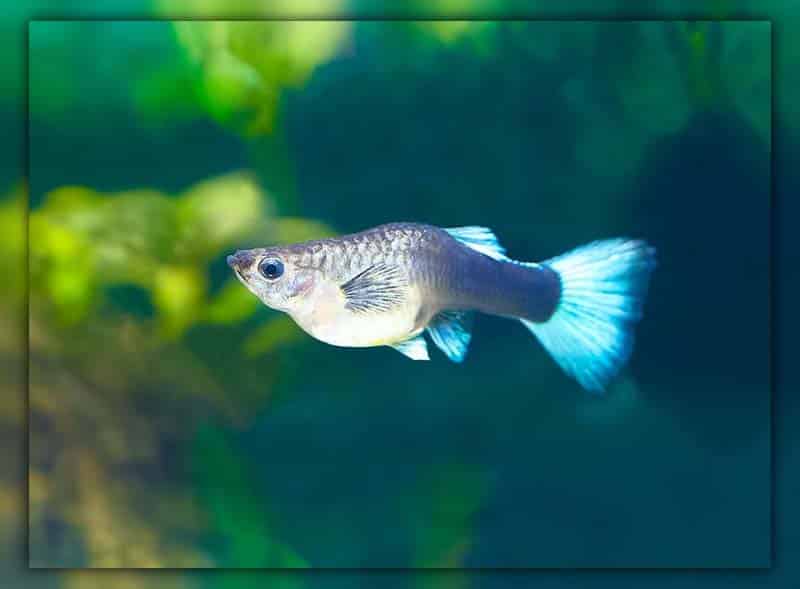
Disease and parasites
Being susceptible to an array of diseases and parasitic attacks, guppies benefit from preemptive measures. Quarantining new tank members and routinely checking fish health can significantly ward off disease proliferation.
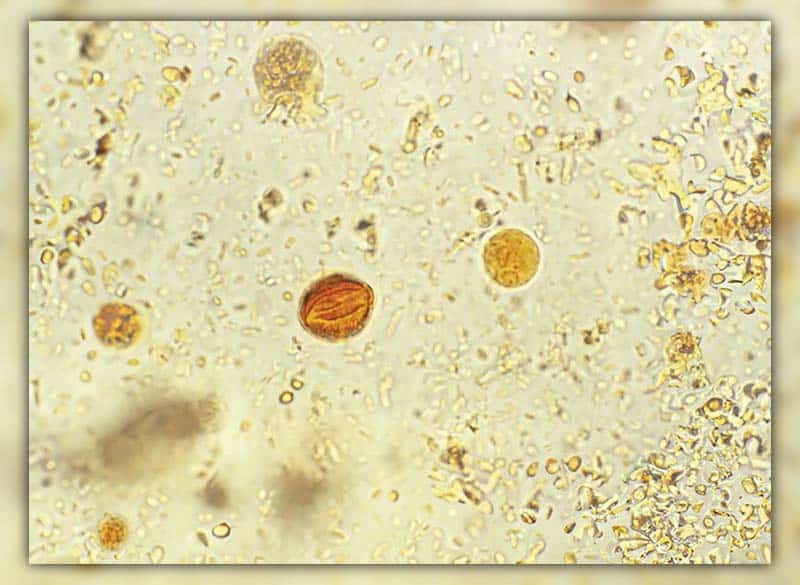
Stress
A calm, consistent environment bolsters a guppy’s immune response, safeguarding them from multiple health challenges. Prioritizing a stress-free setting is central to their well-being.
Diet
Diet is foundational. A comprehensive diet, rich in both plant and animal-derived nutrients, is pivotal. It’s a cornerstone in ensuring the overall health and extended lifespan of guppies.
Lifespan of Guppy in Different Environments
Let’s detail the lifespan of guppies across different environments:
Guppy lifespan in a tank
In a tank setting, guppies usually have a life expectancy of two to three years. However, with optimal conditions, some can even reach the five-year mark. The duration of a guppy’s life in a tank is influenced by factors like the tank’s dimensions, water quality, and population density. For them to flourish:
- Ensure the tank provides ample space for exploration and movement.
- A proficient filtration system is crucial to maintain water purity.
- Periodic water testing helps in ensuring it remains within guppies’ preferred parameters.
- Overpopulating the tank is a misstep—it can induce stress and proliferate diseases.
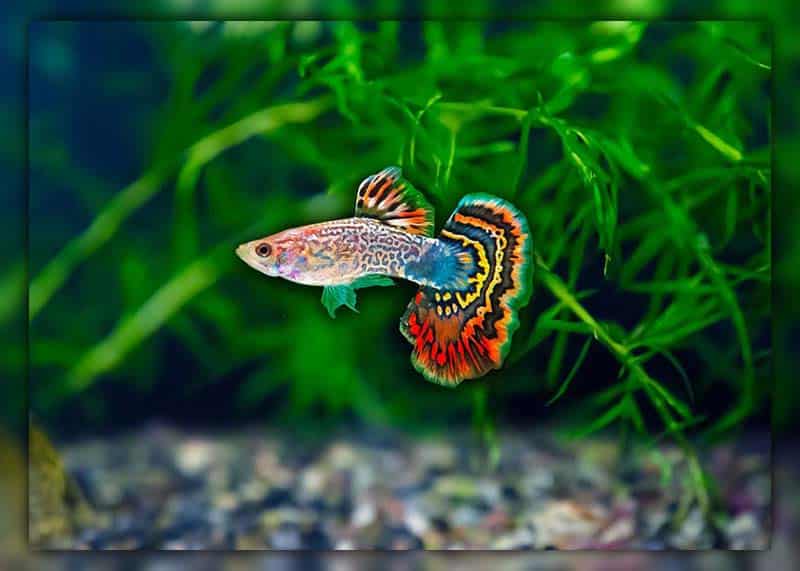
Guppy lifespan in captivity
When kept in captivity, guppies generally live for about two to three years. Some, under excellent care, can even live up to five years. Their lifespan here mirrors the factors influencing their life in tanks, with an added emphasis on the overall care they receive:
- A nourishing diet, pristine water, and a conducive environment are pillars of their well-being.
- Regular health check-ups and swift treatments for any health anomalies are pivotal.
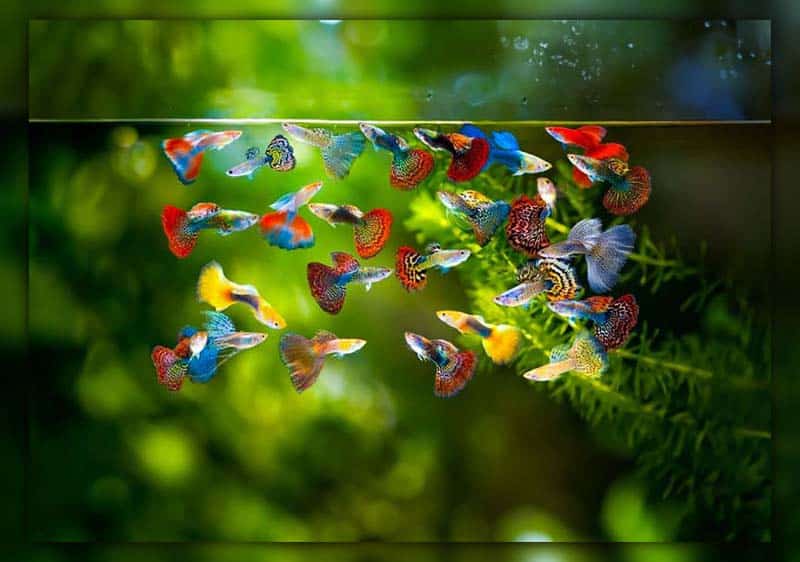
Guppy fish lifespan in a bowl
While guppies are adaptable creatures, housing them in a bowl significantly reduces their lifespan compared to a well-maintained tank. In a bowl, guppies often survive for less than a year due to its constrained space, lack of proper filtration, and rapid water pollution.
These conditions inhibit guppies from swimming freely and compromise the cleanliness of their environment. Without a filtration system, fish waste and other contaminants quickly accumulate, making the water unsuitable for the guppies. It’s essential to provide these vibrant fish with an environment where they can thrive, not merely survive.
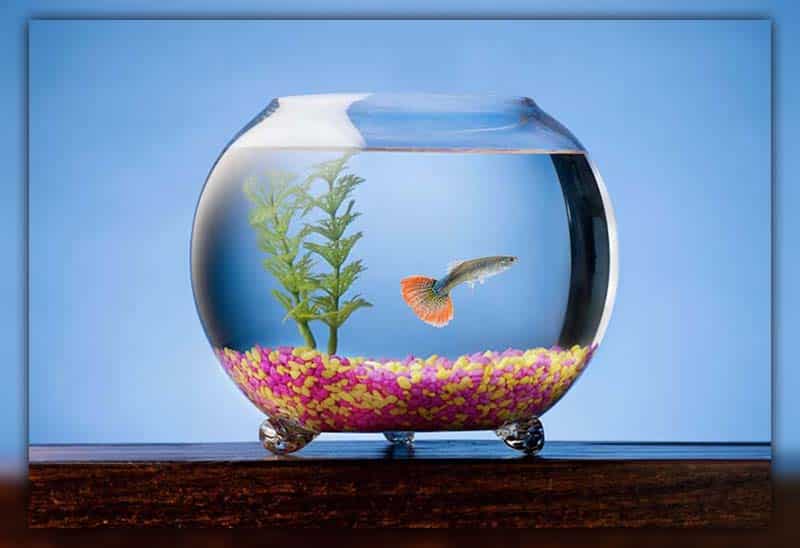
How To Extend The Life Of Your Pet Guppy
Guppies are vibrant tropical fish prized for their dazzling hues and lively disposition. While standard care sees them thriving for two to three years, certain measures can be undertaken to not only extend their lives but ensure they’re healthy and vibrant.
Provide a high-quality diet
Being omnivores, guppies benefit from a mix of both plant and animal-based foods. A well-rounded guppy diet might include:
- Flake and pellet food
- Frozen delicacies like brine shrimp, bloodworms, and daphnia
- Live treats such as microworms, grindal worms, and mosquito larvae
- Aquatic vegetation
Remember, moderation is key. Overfeeding can lead to health complications. It’s best to feed them in small portions, two to three times daily, ensuring they finish their meal in a couple of minutes.
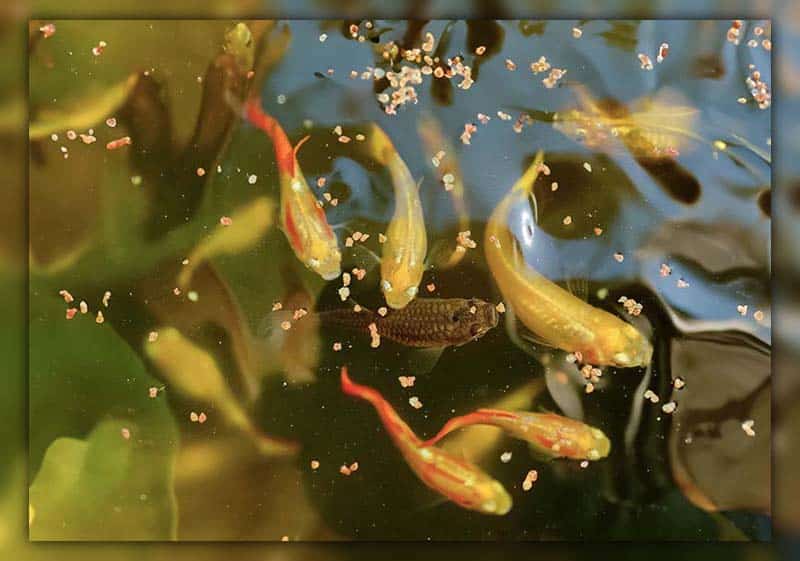
Maintain optimal water quality
Guppies have a keen sensitivity to water conditions. Keep their environment optimal with:
- A temperature range of 72-78°F
- A pH level maintained between 6.8 and 7.8 Regularly replacing 20-25% of the tank’s water weekly helps in removing toxins and maintaining water quality.
Keep the tank clean and free of debris
A pristine tank is vital for your guppy’s health:
- Siphon the tank floor weekly to eliminate debris.
- Ensure filter components are cleaned frequently to operate effectively.
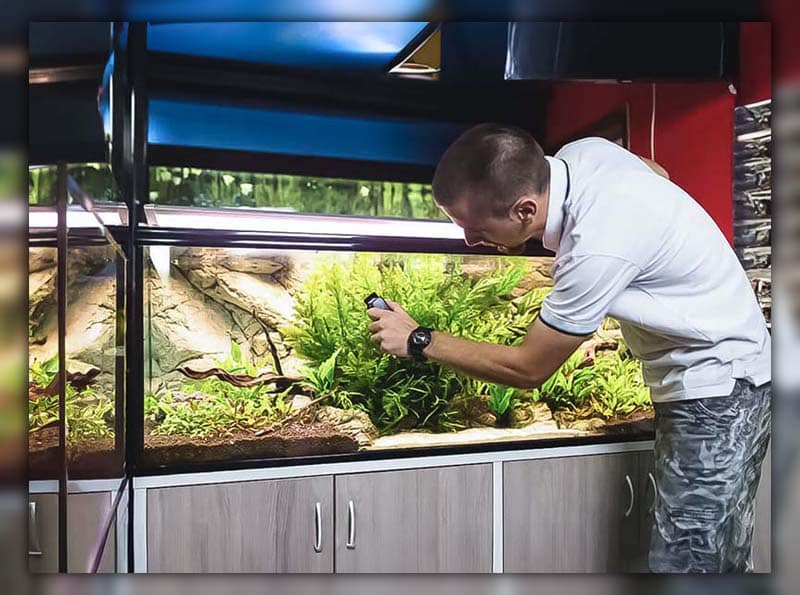
Avoid overcrowding
Guppies are inherently social, but overcrowding can induce undue stress and amplify the risk of diseases. A helpful guideline is dedicating a gallon of water for each inch of guppy. For instance, 10 guppies would ideally require a 10 gallon tank.
Minimize stress
Stress can be detrimental to guppies, making them more prone to illnesses. To foster a stress-free environment:
- Incorporate abundant hiding spots
- Steer clear of abrupt shifts in water conditions or temperature
- Introduce new tank mates gradually
- Remain consistent with feeding routines and tank maintenance
Treat diseases and parasites promptly
Be vigilant for signs of illness or parasites. Early diagnosis followed by timely treatment can be pivotal in preventing disease spread and enhancing recovery prospects. Numerous medications are accessible for typical guppy ailments. For tailored advice, a consultation with a local aquatics expert or veterinarian is beneficial.
Conclusion
In essence, guppy lifespan is influenced by various factors, from their habitat to their diet. Ensuring optimal care can significantly extend a guppy’s life, allowing them to flourish in their vibrant hues for years. To delve deeper into the world of aquatic life and gather more insights, don’t miss out on our other enlightening blogs at National Park Aquarium. Dive in, and let your passion for fishkeeping grow!




